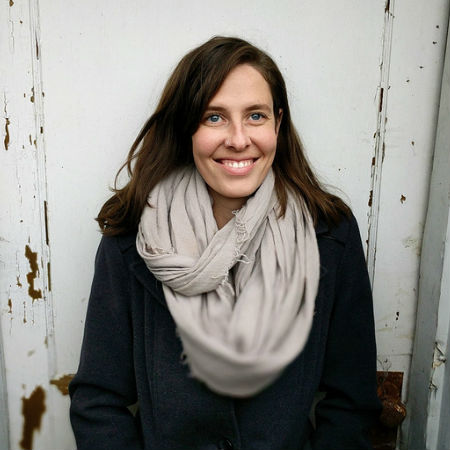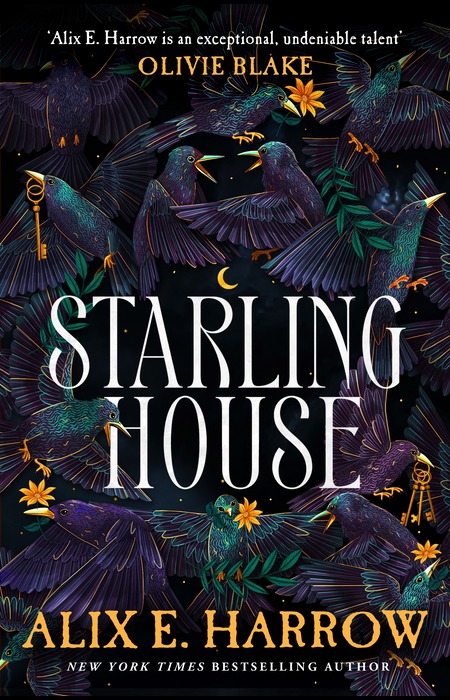(courtesy Pan Macmillan Australia)
We live in a perilously binary world, one that separates everything into stark Os or 1s and refused to entertain the idea of halves, gradients or places in-between.
Armed with that dangerously blinkered mindset, people then begin to assign worth and blame to those that either fit the worldview they have so thoughtlessly and erroneously constructed or who, by chance or design, refuse to for their gloriously idiosyncratic square peg into the round holes they are told they must make their home … or else.
It’s in the “… or else” that Alix E. Harrow’s (The Ten Thousand Doors of January, The Once and Future Witches, A Spindle Splintered) newest and most emotionally resonant novel to date – that’s saying something; they have all been wonderfully affecting, each in their way – Starling House, a story of a lost and much put-upon young woman who finds a home with people and in a place that defies all her expectations of how life plays out.
Opal has always lived on the widely scorned margins, and along with her mother (now passed), and her sixteen-year-old brother Jasper, who might just escape the claustrophobically small Kentucky town in which they live (survive … barely) , she has borne the full brunt of a small-minded gossipy town which long ago decided she had breached the laws of the binary and must be punished for it with rejection, exclusion and a welcome as cold as Hades on an off day.
But he doesn’t open the gate. He leans closer, forehead pressing hard against the iron, fingers wrapping whitely around the bars. My blood is slick and shining across his knuckles.
‘Run,’ he grates.
I run.
Hard and fast, with my left hand curled tight to my chest, still throbbing, but not quite as cold as before.
Her life has been one of being perpetually the Other, the outlier who serves as some kind of twisted warning to everyone else (not a role she has chosen, mind you) of not towing the line in a beleaguered town whose coal-fired power station, run by the mysterious Gravely family, is the sole source of worthwhile economic activity.
She works a menial retail job to support her brother whose brilliant and has a real chance of going to college and making a real life for himself, her only break the free motel room, #12, that she and her brother live in, in a complex overseen by the cranky, irascible Bev who may or may not have a heart of gold.
Life is tough and lonely and so Opal is expecting nothing but disappointment and further malignment on every front when she meets and start unexpectedly working for Arthur, the wan and unsmiling young owner of Starling House, the dauntingly intense home at the heart of her hometown which is surrounded by high walls, a threateningly gothic air and rumours enough to sink a battleship full of the monsters locals claim live in the mist that arises periodically from the river.
You are not supposed to have anything to do with Starling House or its strangely impassive owner, but Opal needs more money that she’s getting from her minimum wage job to ensure Jasper’s future is a bright one, and so she takes on the job of cleaning a house which seems to be strangely awake and alive in a way bricks and mortars buildings should not be.

In Starling House, secrets and defiance of the established binary order of things is everywhere, and while the gossip-bound locals might think they have the truth of the mansion and its century-and-a-half of died-too-young in gruesome and grisly ways inhabitants all sorted, Opal begins to discover that there is far more to Arthur, the house and everything that swirls darkly in and below than meets the eye.
In fact, as she battles Arthur at first and then playfully if fractiously spars with him, she realises that Starling House is as wondrous as it is foreboding and there is a great deal more at stake than making sure long-neglected rooms are cleaned.
As she discovers the true nature of the house and its owner, she also comes hard up against people who wants its armoury of secrets for their own dark purposes and she comes to an unexpected awareness that in this place which seems to repel love, belonging and a sense of home and community that she might have found them all.
A novel which celebrates the Other in all its queer and welcomingly multi-hued diversity, Starling House is a gem of a read, a story that takes the world as we think we know it, with its suppose certainties, firmly etched blacks and white, and concrete realities and upends them, asking us whether the monsters we think we see are really monsters at all and if they should be treated as horrifically as so many people treat them.
A century swimming in her own nightmares has made her very good at this. Her voice has prophetic weight, a certainty that sinks straight through my breastbone. Except: I wouldn’t be alone, would I? Even then, I would have Jasper and Bev and Charlotte and the hellcat.
The short answer is no, of course, and Starling House spends much of its wildly passionate, emotionally raw and fascinatingly fantastical narrative celebrating the fact that life defies any notion of easy, smooth categorisation and that we cleave to such a simplistic view of the world at our peril.
Certainly as Opal finds a home with Arthur and those house itself, and discovers she has a found family around her hidden from view but there all along, she learns that the world is complex and challenging and dark, and that if she wants to hold onto the unexpected home she now has that she’s going to have to fight for it, and fight hard.
Not just against the bigots who likely see queer love and people who markedly diverge from the social norm like Opal and Arthur as crimes against humanity when in fact they are its diverse and gloriously different beating heart, but from people who see the world as something to be exploited and used at all costs and damn anyone who gets in their coldheartedly narcissistic way.
In Starling House, Alix E. Harrow, a writer of uncommon skill, empathy and insight, freely admits the world is dark and broken place populated by far too many people bound to ill-thought out ideas and far-too-small views of life and its many wonders, but she also buoyantly celebrates but not without a great deal of pain and suffering for its protagonists including Opal who comes close to bowing her head to the inevitable but inspiringly never does, that we live in a landscape of wonders and diversity and buoyant vivacity and they though darkness might threaten it, if we cling to that salient fact we may yet find our home and that elusive sense of happy-ever-after.
